Academic Integrity: Definitions, Consequences and Importance Essay
VerifiedAdded on 2023/03/21
|6
|1038
|42
Essay
AI Summary
This essay provides a comprehensive overview of academic integrity, defining it as a set of values and principles guiding researchers and academics. It explores the concept of plagiarism, detailing various forms such as direct, self, mosaic, and accidental plagiarism. The essay outlines the consequences of violating academic integrity, including potential assignment failure, negative impacts on future career prospects, and even expulsion from the university. It emphasizes the importance of academic integrity in fostering trust and ensuring the reliability of academic work while highlighting the role of academic integrity in promoting innovation and upholding ethical standards. The conclusion addresses the challenges of maintaining academic integrity in the digital age and suggests strategies for combating plagiarism and promoting ethical behavior in education.
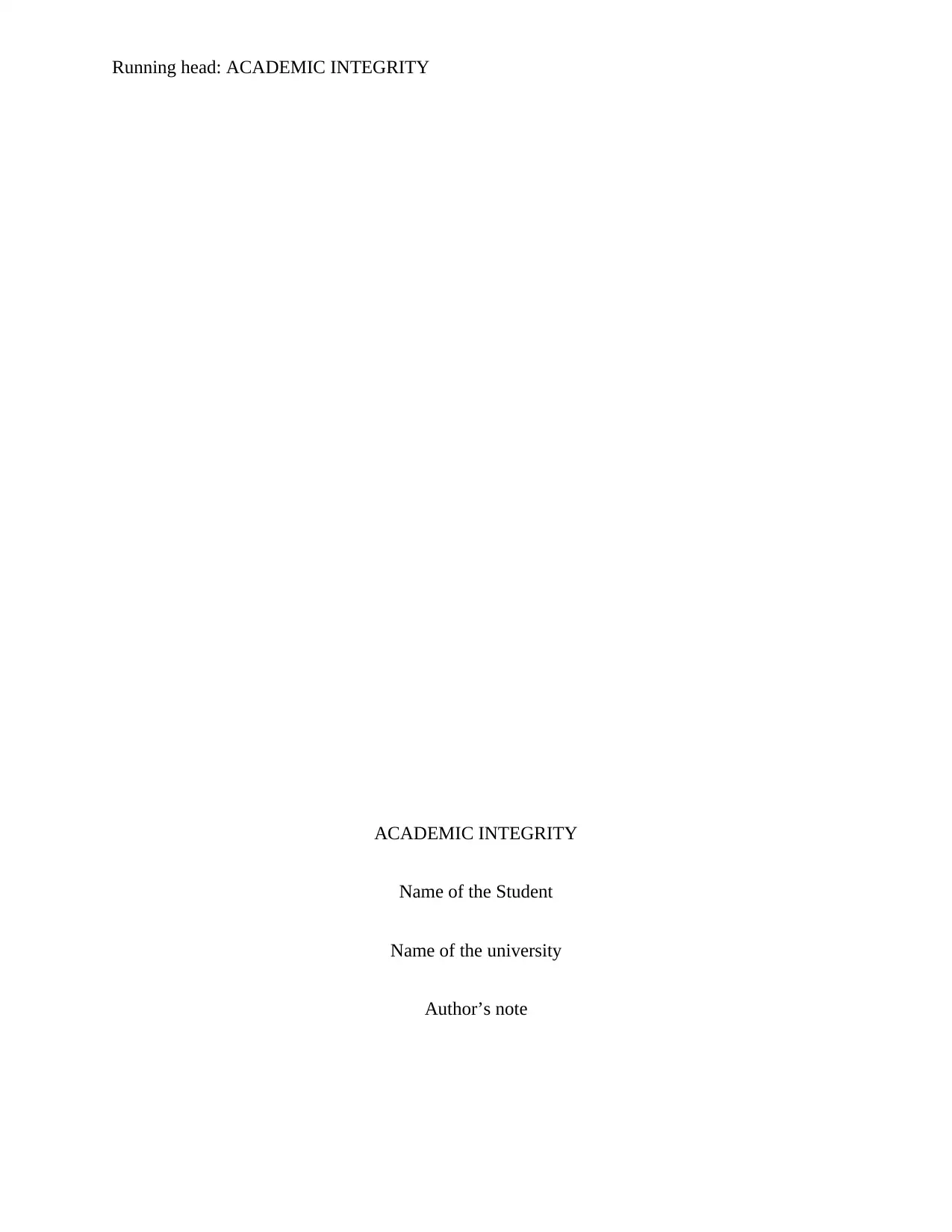
Running head: ACADEMIC INTEGRITY
ACADEMIC INTEGRITY
Name of the Student
Name of the university
Author’s note
ACADEMIC INTEGRITY
Name of the Student
Name of the university
Author’s note
Paraphrase This Document
Need a fresh take? Get an instant paraphrase of this document with our AI Paraphraser
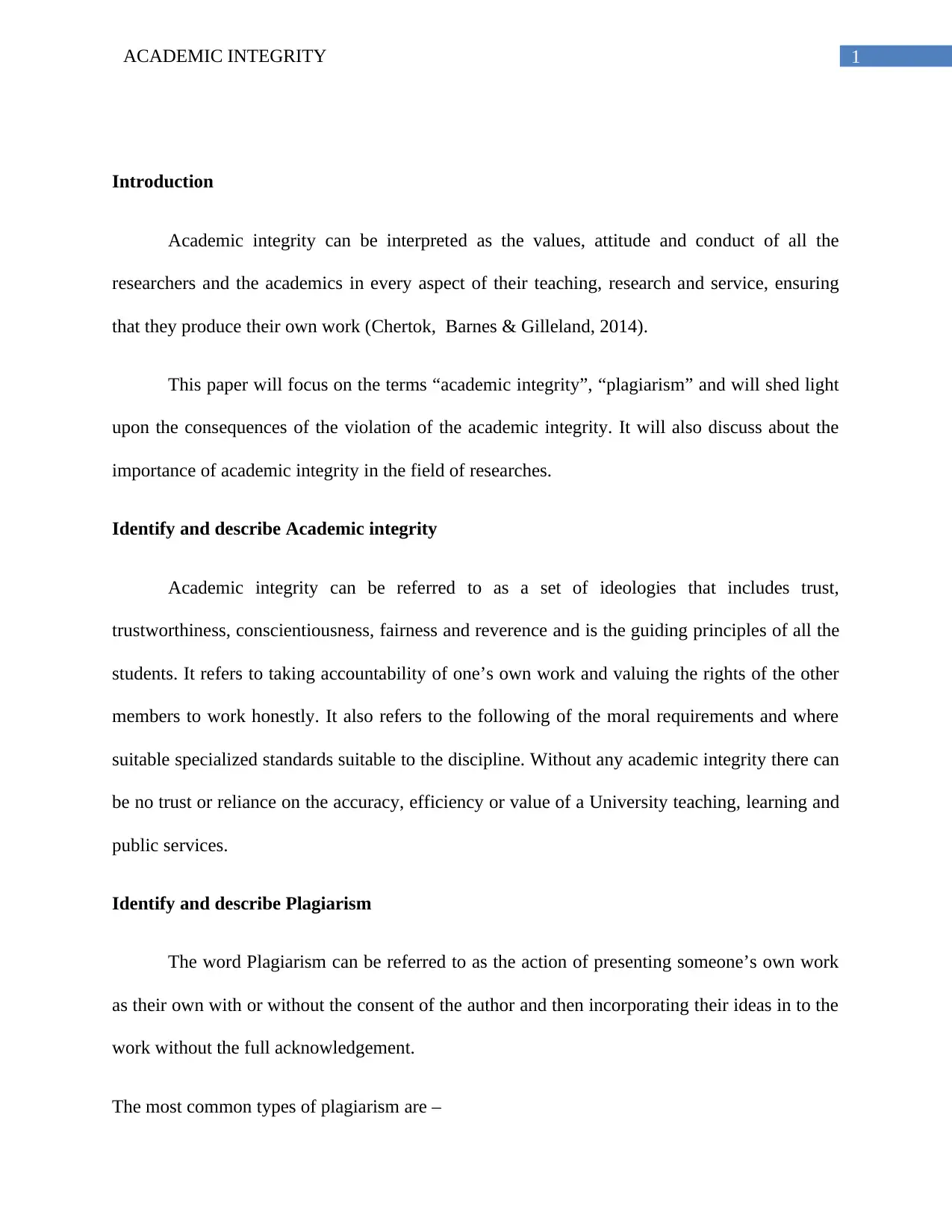
1ACADEMIC INTEGRITY
Introduction
Academic integrity can be interpreted as the values, attitude and conduct of all the
researchers and the academics in every aspect of their teaching, research and service, ensuring
that they produce their own work (Chertok, Barnes & Gilleland, 2014).
This paper will focus on the terms “academic integrity”, “plagiarism” and will shed light
upon the consequences of the violation of the academic integrity. It will also discuss about the
importance of academic integrity in the field of researches.
Identify and describe Academic integrity
Academic integrity can be referred to as a set of ideologies that includes trust,
trustworthiness, conscientiousness, fairness and reverence and is the guiding principles of all the
students. It refers to taking accountability of one’s own work and valuing the rights of the other
members to work honestly. It also refers to the following of the moral requirements and where
suitable specialized standards suitable to the discipline. Without any academic integrity there can
be no trust or reliance on the accuracy, efficiency or value of a University teaching, learning and
public services.
Identify and describe Plagiarism
The word Plagiarism can be referred to as the action of presenting someone’s own work
as their own with or without the consent of the author and then incorporating their ideas in to the
work without the full acknowledgement.
The most common types of plagiarism are –
Introduction
Academic integrity can be interpreted as the values, attitude and conduct of all the
researchers and the academics in every aspect of their teaching, research and service, ensuring
that they produce their own work (Chertok, Barnes & Gilleland, 2014).
This paper will focus on the terms “academic integrity”, “plagiarism” and will shed light
upon the consequences of the violation of the academic integrity. It will also discuss about the
importance of academic integrity in the field of researches.
Identify and describe Academic integrity
Academic integrity can be referred to as a set of ideologies that includes trust,
trustworthiness, conscientiousness, fairness and reverence and is the guiding principles of all the
students. It refers to taking accountability of one’s own work and valuing the rights of the other
members to work honestly. It also refers to the following of the moral requirements and where
suitable specialized standards suitable to the discipline. Without any academic integrity there can
be no trust or reliance on the accuracy, efficiency or value of a University teaching, learning and
public services.
Identify and describe Plagiarism
The word Plagiarism can be referred to as the action of presenting someone’s own work
as their own with or without the consent of the author and then incorporating their ideas in to the
work without the full acknowledgement.
The most common types of plagiarism are –
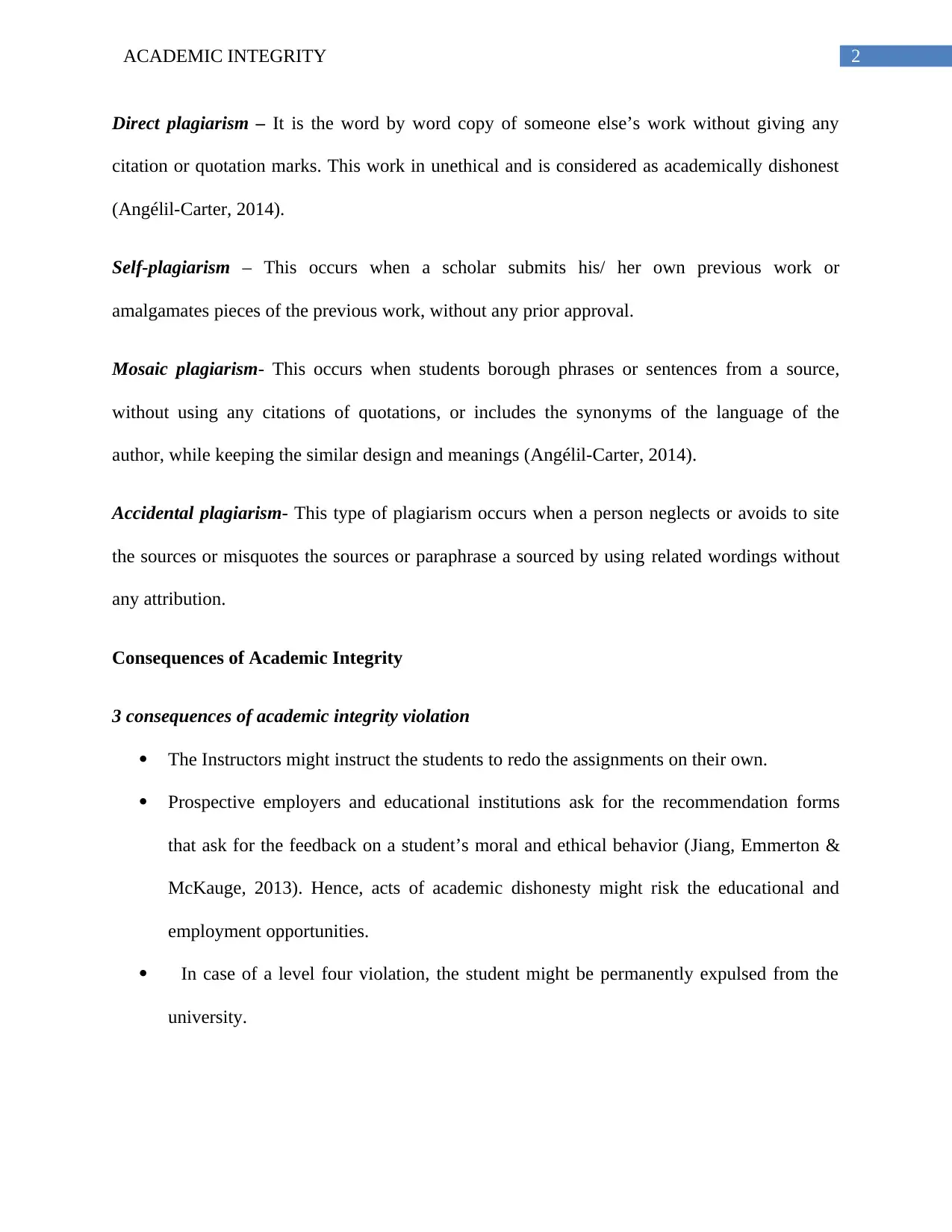
2ACADEMIC INTEGRITY
Direct plagiarism – It is the word by word copy of someone else’s work without giving any
citation or quotation marks. This work in unethical and is considered as academically dishonest
(Angélil-Carter, 2014).
Self-plagiarism – This occurs when a scholar submits his/ her own previous work or
amalgamates pieces of the previous work, without any prior approval.
Mosaic plagiarism- This occurs when students borough phrases or sentences from a source,
without using any citations of quotations, or includes the synonyms of the language of the
author, while keeping the similar design and meanings (Angélil-Carter, 2014).
Accidental plagiarism- This type of plagiarism occurs when a person neglects or avoids to site
the sources or misquotes the sources or paraphrase a sourced by using related wordings without
any attribution.
Consequences of Academic Integrity
3 consequences of academic integrity violation
The Instructors might instruct the students to redo the assignments on their own.
Prospective employers and educational institutions ask for the recommendation forms
that ask for the feedback on a student’s moral and ethical behavior (Jiang, Emmerton &
McKauge, 2013). Hence, acts of academic dishonesty might risk the educational and
employment opportunities.
In case of a level four violation, the student might be permanently expulsed from the
university.
Direct plagiarism – It is the word by word copy of someone else’s work without giving any
citation or quotation marks. This work in unethical and is considered as academically dishonest
(Angélil-Carter, 2014).
Self-plagiarism – This occurs when a scholar submits his/ her own previous work or
amalgamates pieces of the previous work, without any prior approval.
Mosaic plagiarism- This occurs when students borough phrases or sentences from a source,
without using any citations of quotations, or includes the synonyms of the language of the
author, while keeping the similar design and meanings (Angélil-Carter, 2014).
Accidental plagiarism- This type of plagiarism occurs when a person neglects or avoids to site
the sources or misquotes the sources or paraphrase a sourced by using related wordings without
any attribution.
Consequences of Academic Integrity
3 consequences of academic integrity violation
The Instructors might instruct the students to redo the assignments on their own.
Prospective employers and educational institutions ask for the recommendation forms
that ask for the feedback on a student’s moral and ethical behavior (Jiang, Emmerton &
McKauge, 2013). Hence, acts of academic dishonesty might risk the educational and
employment opportunities.
In case of a level four violation, the student might be permanently expulsed from the
university.
⊘ This is a preview!⊘
Do you want full access?
Subscribe today to unlock all pages.

Trusted by 1+ million students worldwide
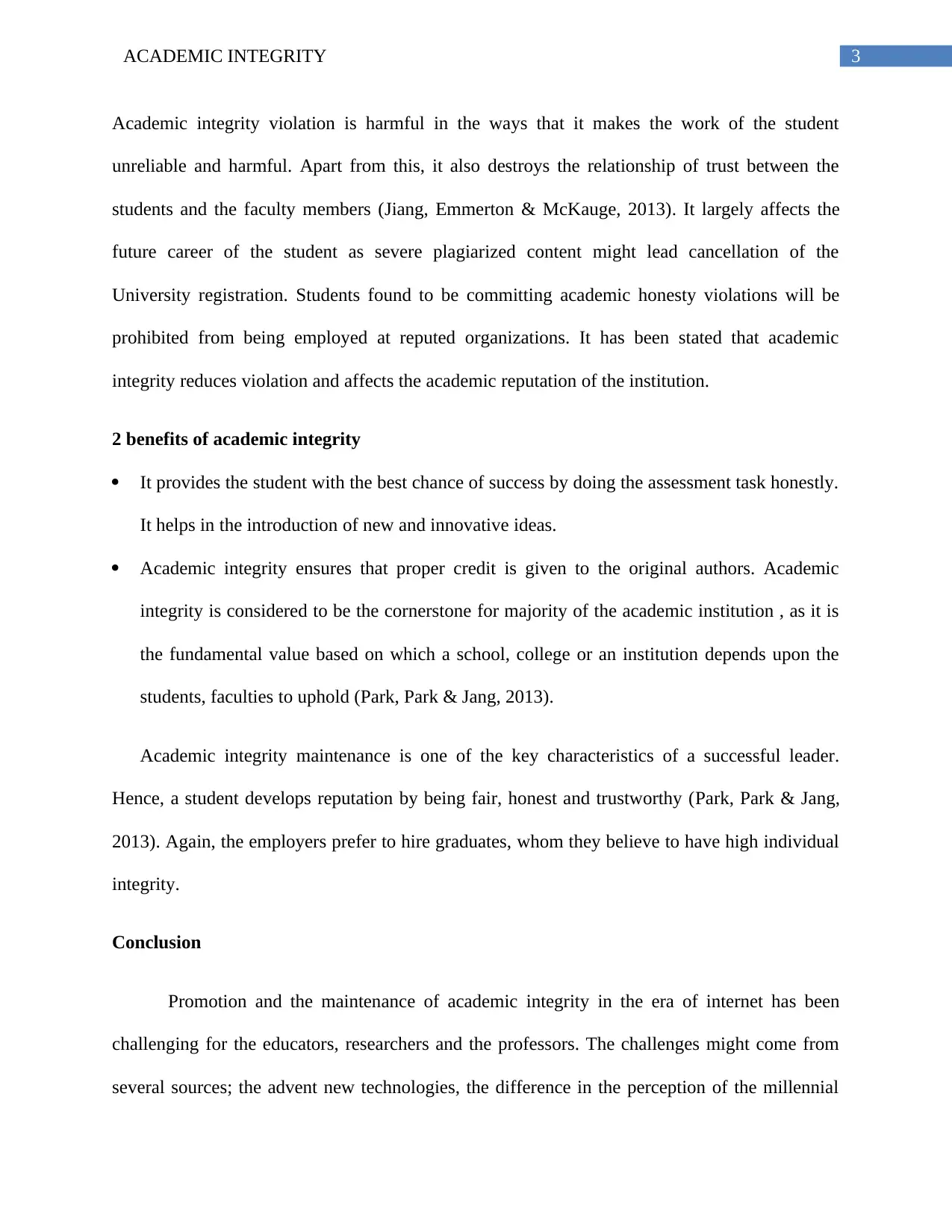
3ACADEMIC INTEGRITY
Academic integrity violation is harmful in the ways that it makes the work of the student
unreliable and harmful. Apart from this, it also destroys the relationship of trust between the
students and the faculty members (Jiang, Emmerton & McKauge, 2013). It largely affects the
future career of the student as severe plagiarized content might lead cancellation of the
University registration. Students found to be committing academic honesty violations will be
prohibited from being employed at reputed organizations. It has been stated that academic
integrity reduces violation and affects the academic reputation of the institution.
2 benefits of academic integrity
It provides the student with the best chance of success by doing the assessment task honestly.
It helps in the introduction of new and innovative ideas.
Academic integrity ensures that proper credit is given to the original authors. Academic
integrity is considered to be the cornerstone for majority of the academic institution , as it is
the fundamental value based on which a school, college or an institution depends upon the
students, faculties to uphold (Park, Park & Jang, 2013).
Academic integrity maintenance is one of the key characteristics of a successful leader.
Hence, a student develops reputation by being fair, honest and trustworthy (Park, Park & Jang,
2013). Again, the employers prefer to hire graduates, whom they believe to have high individual
integrity.
Conclusion
Promotion and the maintenance of academic integrity in the era of internet has been
challenging for the educators, researchers and the professors. The challenges might come from
several sources; the advent new technologies, the difference in the perception of the millennial
Academic integrity violation is harmful in the ways that it makes the work of the student
unreliable and harmful. Apart from this, it also destroys the relationship of trust between the
students and the faculty members (Jiang, Emmerton & McKauge, 2013). It largely affects the
future career of the student as severe plagiarized content might lead cancellation of the
University registration. Students found to be committing academic honesty violations will be
prohibited from being employed at reputed organizations. It has been stated that academic
integrity reduces violation and affects the academic reputation of the institution.
2 benefits of academic integrity
It provides the student with the best chance of success by doing the assessment task honestly.
It helps in the introduction of new and innovative ideas.
Academic integrity ensures that proper credit is given to the original authors. Academic
integrity is considered to be the cornerstone for majority of the academic institution , as it is
the fundamental value based on which a school, college or an institution depends upon the
students, faculties to uphold (Park, Park & Jang, 2013).
Academic integrity maintenance is one of the key characteristics of a successful leader.
Hence, a student develops reputation by being fair, honest and trustworthy (Park, Park & Jang,
2013). Again, the employers prefer to hire graduates, whom they believe to have high individual
integrity.
Conclusion
Promotion and the maintenance of academic integrity in the era of internet has been
challenging for the educators, researchers and the professors. The challenges might come from
several sources; the advent new technologies, the difference in the perception of the millennial
Paraphrase This Document
Need a fresh take? Get an instant paraphrase of this document with our AI Paraphraser
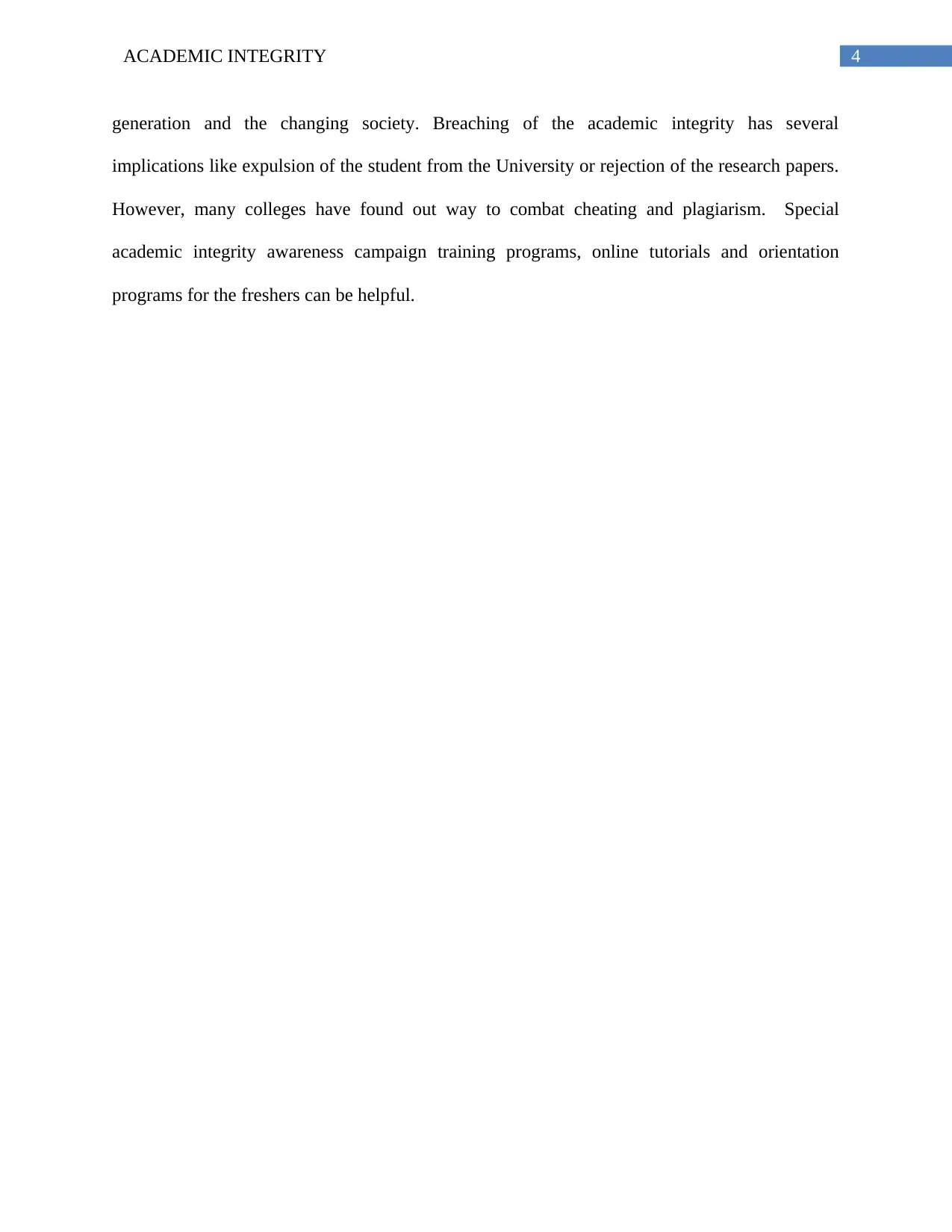
4ACADEMIC INTEGRITY
generation and the changing society. Breaching of the academic integrity has several
implications like expulsion of the student from the University or rejection of the research papers.
However, many colleges have found out way to combat cheating and plagiarism. Special
academic integrity awareness campaign training programs, online tutorials and orientation
programs for the freshers can be helpful.
generation and the changing society. Breaching of the academic integrity has several
implications like expulsion of the student from the University or rejection of the research papers.
However, many colleges have found out way to combat cheating and plagiarism. Special
academic integrity awareness campaign training programs, online tutorials and orientation
programs for the freshers can be helpful.
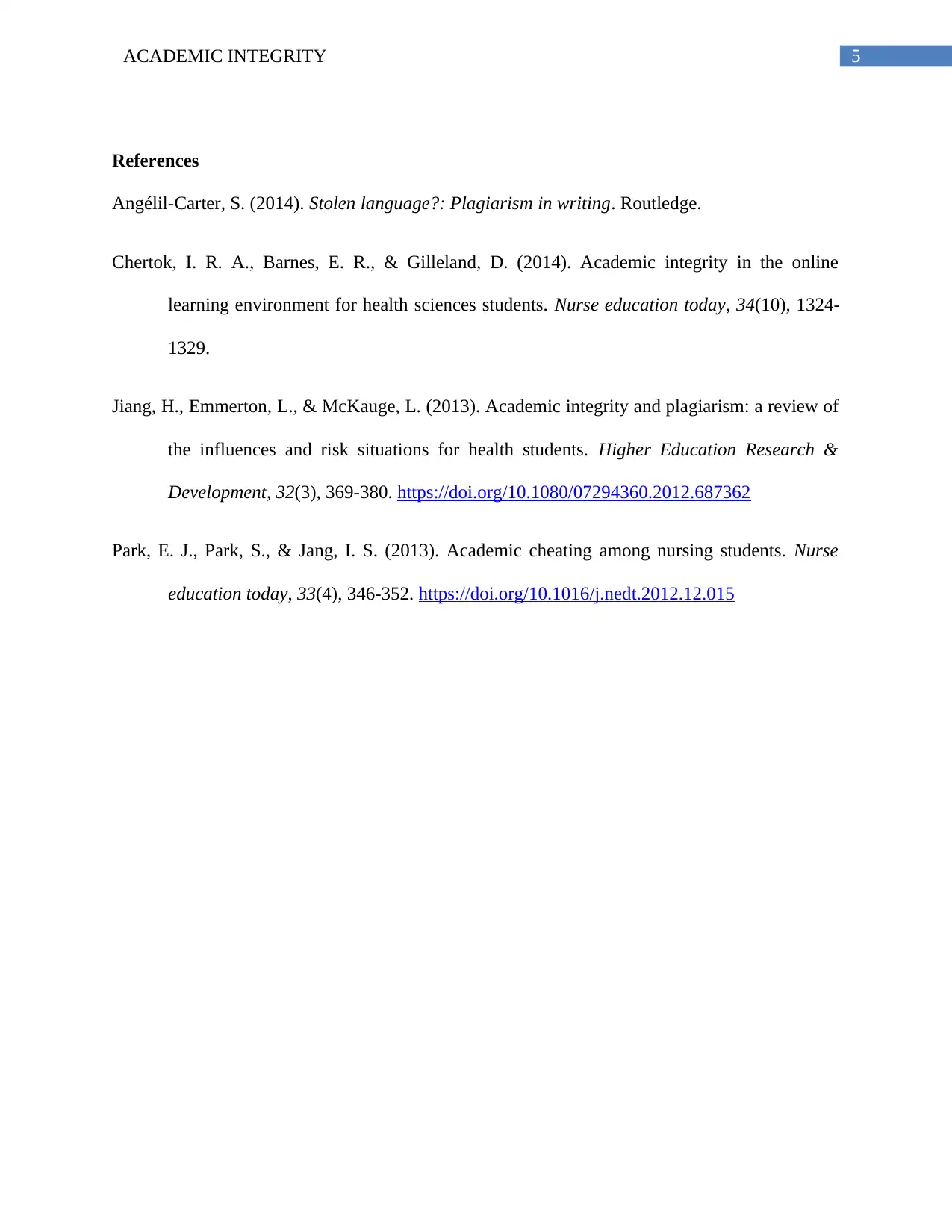
5ACADEMIC INTEGRITY
References
Angélil-Carter, S. (2014). Stolen language?: Plagiarism in writing. Routledge.
Chertok, I. R. A., Barnes, E. R., & Gilleland, D. (2014). Academic integrity in the online
learning environment for health sciences students. Nurse education today, 34(10), 1324-
1329.
Jiang, H., Emmerton, L., & McKauge, L. (2013). Academic integrity and plagiarism: a review of
the influences and risk situations for health students. Higher Education Research &
Development, 32(3), 369-380. https://doi.org/10.1080/07294360.2012.687362
Park, E. J., Park, S., & Jang, I. S. (2013). Academic cheating among nursing students. Nurse
education today, 33(4), 346-352. https://doi.org/10.1016/j.nedt.2012.12.015
References
Angélil-Carter, S. (2014). Stolen language?: Plagiarism in writing. Routledge.
Chertok, I. R. A., Barnes, E. R., & Gilleland, D. (2014). Academic integrity in the online
learning environment for health sciences students. Nurse education today, 34(10), 1324-
1329.
Jiang, H., Emmerton, L., & McKauge, L. (2013). Academic integrity and plagiarism: a review of
the influences and risk situations for health students. Higher Education Research &
Development, 32(3), 369-380. https://doi.org/10.1080/07294360.2012.687362
Park, E. J., Park, S., & Jang, I. S. (2013). Academic cheating among nursing students. Nurse
education today, 33(4), 346-352. https://doi.org/10.1016/j.nedt.2012.12.015
⊘ This is a preview!⊘
Do you want full access?
Subscribe today to unlock all pages.

Trusted by 1+ million students worldwide
1 out of 6
Related Documents
Your All-in-One AI-Powered Toolkit for Academic Success.
+13062052269
info@desklib.com
Available 24*7 on WhatsApp / Email
![[object Object]](/_next/static/media/star-bottom.7253800d.svg)
Unlock your academic potential
Copyright © 2020–2026 A2Z Services. All Rights Reserved. Developed and managed by ZUCOL.





